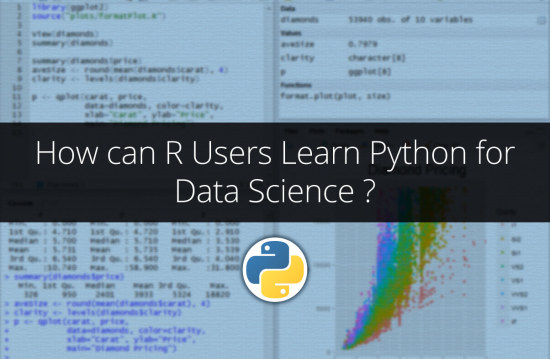How can R Users Learn Python for Data Science ?
- by 7wData

Python is a supremely powerful and a multi-purpose programming language. It has grown phenomenally in the last few years. It is used for web development, game development, and now data analysis / machine learning. Data analysis and machine learning is a relatively new branch in python.
For a beginner in data science, learning python for data analysis can be really painful. Why ? You try Googling "learn python," and you'll get tons of tutorials only meant for learning python for web development. How can you find a way then ?
In this tutorial, we'll be exploring the basics of python for performing data manipulation tasks. Alongside, we'll also look how you do it in R. This parallel comparison will help you relate the set of tasks you do in R to how you do it in python! And in the end, we'll take up a data set and practice our newly acquired python skills.
Note: This article is best suited for people who have a basic knowledge of R language.
1. Why learn Python (even if you already know R)
No doubt, R is tremendously great at what it does. In fact, it was originally designed for doing statistical computing and manipulations. Its incredible community support allows a beginner to learn R quickly.
But, python is catching up fast. Established companies and startups have embraced python at a much larger scale compared to R.
According to indeed.com (from Jan 2016 to November 2016), the Number of job postings seeking "machine learning python" increased much faster (approx. 123%) than "machine learning in R" jobs. Do you know why ? It is because
2. Understanding Data Types and Structures in Python vs. R:
These programming languages understand the complexity of a data set based on its variables and data types. Yes! Let's say you have a data set with one million rows and 50 columns. How would these programming languages understand the data ?
Basically, both R and Python have pre-defined data types. The dependent and independent variables get classified among these data types. And, based on the data type, the interpreter allots memory for use. Python supports the following data types:
Numbers- It stores numeric values. These numeric values can be stored in 4 types: Integer, long, float, and complex. Let's understand them. Integer - It refers to whole numbers such as 10,13,91,102, etc. It is the same as R's type. Long - It refers to long integers which are represented in octa and hexadecimal. In R, you use package to read hexadecimal values. Float - It refers to decimal values such as 1.23, 9.89, etc. It is the same as R's type.
[Social9_Share class=”s9-widget-wrapper”]
Upcoming Events
Shift Difficult Problems Left with Graph Analysis on Streaming Data
29 April 2024
12 PM ET – 1 PM ET
Read MoreCategories
You Might Be Interested In
Uber to provide ‘anonymized’ data to city officials
13 Jan, 2017Uber Technologies is offering data from trips on its ride-hailing platform to city officials, planners and policymakers to help them …
The Role Of Data Governance In An Effective Compliance Program
21 Dec, 2018An effective compliance program is comprised of many moving parts. Critical data is coming in from the variety of tools, …
Data Intelligence: Artificial Or Very Real?
27 Sep, 2019The first time I heard the term “data intelligence,” I figured it must have been around for a while. We …
Recent Jobs
Do You Want to Share Your Story?
Bring your insights on Data, Visualization, Innovation or Business Agility to our community. Let them learn from your experience.
Privacy Overview
Get the 3 STEPS
To Drive Analytics Adoption
And manage change




